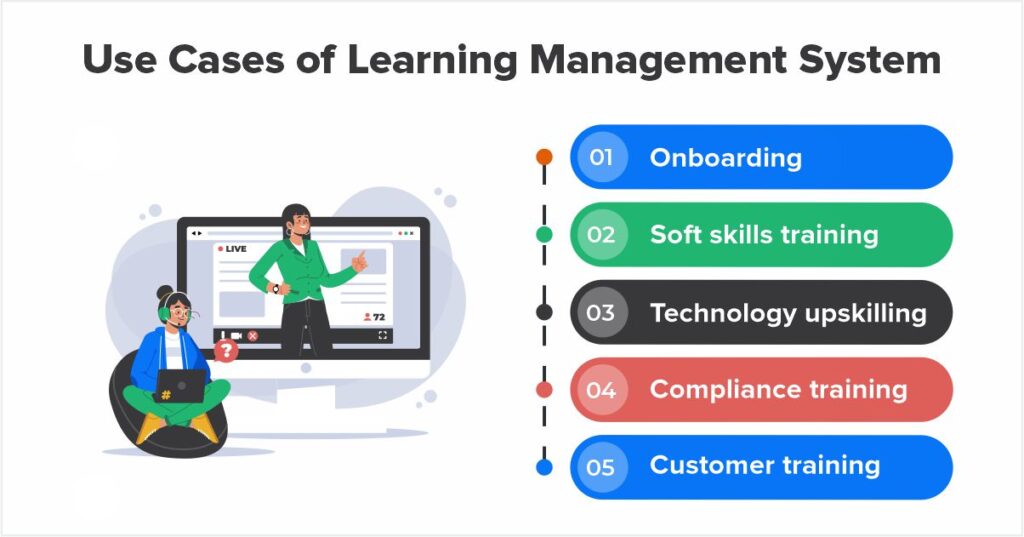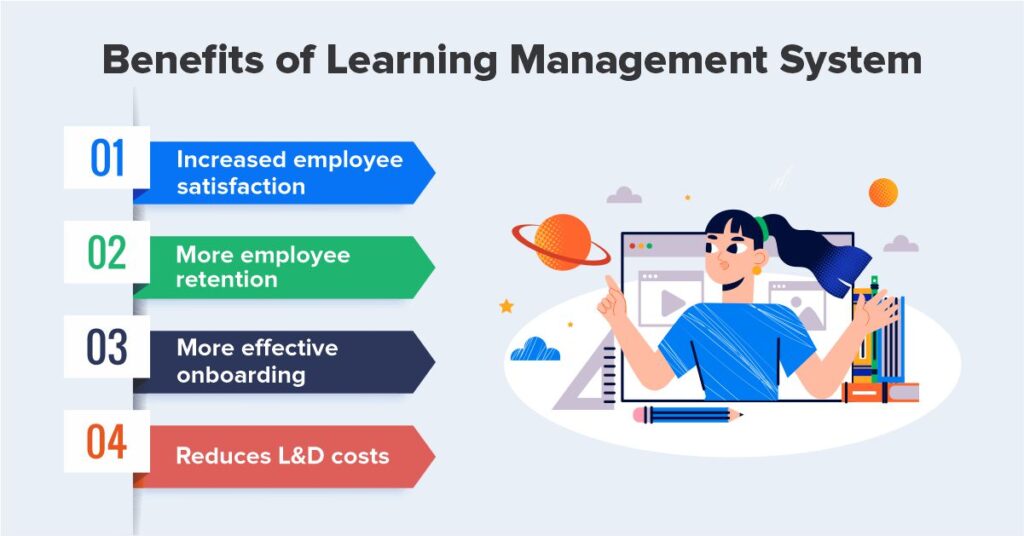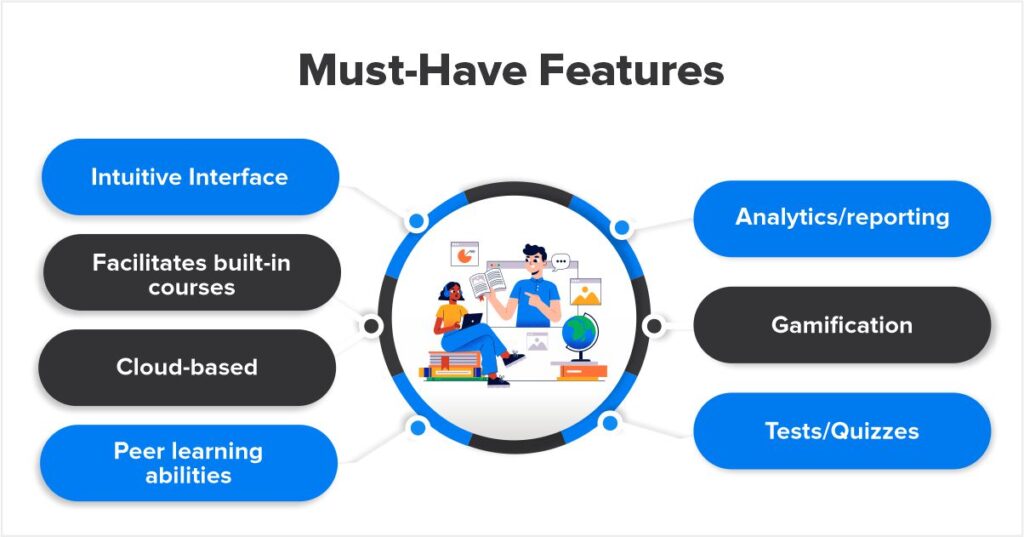Learning Management System: Use Cases, Benefits & Features
Published on 17 Nov 2021

Learning Management System: Use Cases, Benefits & Features
There is no doubt that online training and learning is the way of the future. 57% of L&D departments are planning to spend more time and capital on online learning, according to the 2020 LinkedIn Workplace Learning Report. After the recent COVID-19 pandemic, an effective mechanism for online training has become more important than ever as businesses are increasingly transitioning to remote and hybrid work cultures.
However, diving headfirst into online learning needs a lot of thought – Where will you create online courses? How do you create them? Where will they live? And how will you gauge their effectiveness?
Learning management systems are the foundation of online training programs. You need an effective learning management system to create and distribute courses, manage training, and track results. In this blog, we will be covering everything you need to know about the learning management system – use cases, benefits and features.
Let’s start with the basics first-
I. What is a Learning Management System?
Keeping it simple, a learning management system is software that enables creating, managing and delivering online training courses. LMS for corporates manage their online learning programs and help them in tracking the results of their courses.
The powerhouse of complete online learning technology, LMS for business is best when it is flexible and scalable to the various needs of your learners.
Learning management systems can be used to deploy various learning strategies across different learning formats such as formal, social and experiential learning to manage functions such as sales enablement, compliance training and certification management.
II. Use Cases of Learning Management System-
LMS for business is mainly used for standard employee training. However, there are several use cases of learning management systems. Here are some of them –

Onboarding-
A strong onboarding process is required to set the right tone for your company and results in prepared employees. Organizations with the right onboarding processes have experienced a 70% increase in productivity and an 82% increase in new-hire.
Onboarding becomes more crucial in remote working environments where employees don’t get a chance to learn in person. With a learning management system, you can deliver seamless onboarding to employees working remotely or from the office and make sure that the new hires are prepared for the jobs at the company from day 1.
Soft skills training-
Soft skills are something that is very imperative for the smooth functioning of the company, and the hardest thing to train for. With a learning management system, you can create interactive courses that teach leadership skills, time-management techniques, conflict resolution and more.
Technology upskilling-
According to a report by IBM, there are more than 120 million employees across all industries who need to be reskilled over the period of next three years to handle advancement in AI automation. Online training is one of the most cost-effective ways to align employees with new and trending technologies.
Compliance training-
LMS is an effective way of conducting compliance training to mitigate risk and maintain company liability. Since, with the LMS software, you will have a clear record that employees completed the compliance training. Diversity training and courses on harassment training, workplace safety all reduce risk and encourage a healthy work culture.
Customer training-
With LMS, you don’t have to limit your course offering to the people working with you. LMS for corporate can also be used to onboard new customers, educate potential clients, and teach new features to existing customers. Creating standardized online courses is more effective and engaging than in-person training for every client.
III. Benefits of Learning Management System
Here are some of the positive effects of a learning management system –

Increased employee satisfaction –
According to Vyond The Surface study on Workplace Attitude, 51% of employees prefer online training over traditional instructor-led training. This clearly states that online learning programs are highly convenient and far more enjoyable than sitting the whole day.
More employee retention-
A whopping 94% of employees reported that they would stay with a company for a longer period of time if the company invests in their career, according to LinkedIn’s 2018 workplace learning report. Helping employees enhance their skills and build a pathway is a great way to show commitment to them.
More effective onboarding-
A solid and effective onboarding process helps engage and keep a hold on to new hires and sets the tone for life at the company. Studies show that effective and comprehensive onboarding processes increase the chances of employees staying at the job by 69%.
Reduces L&D costs-
While initially, the costs of purchasing LMS for business may be high, however, creating online courses that can be repeated whenever required is significantly cheaper than running an in-person training program.
IV. Must-Have Features –

Intuitive Interface –
An LMS for business should have easy-to-understand and easy-to-use features both on the frontend and backend. It should be easy for the L&D department to create courses on LMS, and for employees to navigate through those courses.
Facilitates built-in courses –
Unless you have a dedicated instructional designer, look for a learning management system that lets you build courses directly from the platform. Probably go for a code-free editor that has a drag and drop option to add all types of media.
Cloud-based –
While some companies prefer hard-drive-based, on-premises LMS, cloud-based LMSs for corporates are more flexible as they can be accessed from anywhere. Users should be able to access courses, tests and quizzes without downloading any special software.
Peer learning abilities –
Collaborative learning comes with a number of practical and psychological benefits. Look for a learning management system that enables team members to share their knowledge and learn together. This includes features like peer review, discussion boards and the ability to collaborate on course action.
Analytics/reporting –
Assessing how your courses are performing in terms of completion and engagement help you refine techniques and come up with more effective courses in the future.
Gamification-
Features like gamification are one of the easiest ways to promote active learning and increase the course completion rate. Gamification includes levels, leaderboards, rewards and more to make the courses more engaging.
Tests/Quizzes-
It is good to go for a platform that enables building your own quizzes, tests and assignments to evaluate your learning material.
If your use cases match with the ones described above in the blog and you are looking for LMS for corporate with similar features, then Swotter is your go-to option. Swotter is a cloud-based learning management system that is designed to offer a great training experience for every type of team. Whether you need LMS for corporate or your education institute, Swotter can cater for your needs.
The software is equipped with features like reports, gamification, content discovery, tests and quizzes and more to make online learning seamless for you and your users.
Customers, employees and partners who use Swotter love learning because everything from compliance training to onboarding, unique features and seamless usability provides a hassle-free and interactive learning experience. Get in touch with us to explore more features of Swotter and know how it can benefit your business.
Related posts
Generative AI
Artificial Intelligence
Growth and Digital Strategy
UK’s Generative AI Investment Surge: Big Tech Bets And Why Execution Matters
01 Oct 2025
Cloud Services
How to Choose the Right AWS Certified Partner: A Business Leader’s Guide
23 Apr 2025
Let’s talk, no strings attached.